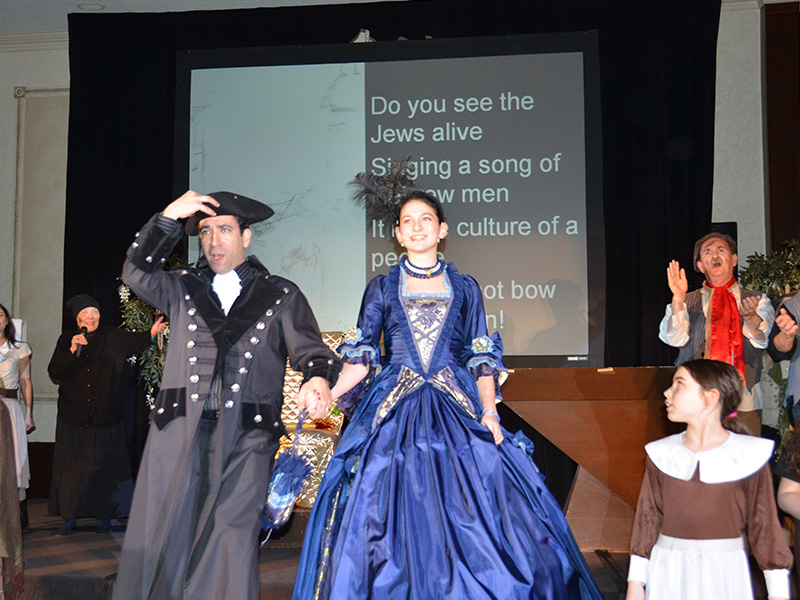If you thrill to musical parodies with titles such as Return of the Jew-di, Megilla-Mia and The Wizard of Schnoz, then Purim is your holiday.
The Purim shpiel, a medieval custom of presenting the Purim story in song and drama, with an emphasis on gently mocking the clergy and community members, is alive and well.
Today, however, the amateur theatrical borrows liberally from Broadway and Hollywood, rewriting popular music to tell the ancient tale of Esther, Mordechai and the anti-Semitism of the Persian court.
READ: WHAT PURIM TEACHES US ABOUT FAKE NEWS
“It’s a great story. You can take so many movie plots or fairy tales, and there’s always going to be a Haman-ish character or a Queen Esther-y character,” said Erica Denburg, a teacher who directs the annual Purim shpiel at Toronto’s First Narayever Congregation.
“You think it’s going to be a struggle to see it that way, but I found that every year, it very quickly presents itself.”
With themes as universal as courage, wickedness and political intrigue, the Purim story is endlessly malleable. It’s not a stretch to picture Queen Esther as a plucky young Dorothy, navigating through Shushan instead of Oz. And the Narayever’s production didn’t have to work hard this year to reimagine King Achashverosh as Jabba the Hutt, the powerful crime boss from the Star Wars franchise, renamed as Ahuttverosh.
Every good play starts with a script, and Purim shpiels are no exception. Some synagogues buy a script off the shelf (available at, among other places, purimshpiel.com) and then modify it to meet their own needs.
But some create their own, changing the lyrics to existing songs and writing a script.
At Toronto’s Beth Emeth Synagogue, writing the script and music takes about a month and starts in the summer, says director Simone Goldberg. “Sometimes we’re still writing the play and tweaking it during rehearsals,” which start in the fall, after the High Holidays, she said.
READ: IS PURIM THE ULTIMATE HIPSTER HOLIDAY?
While the plays are light-hearted, they still take gentle jabs at the synagogue’s clergy and staff, and sometimes include topical satire. The Narayever’s Purim play is influenced by events south of the border this year, with Haman promising “to make Shushan great again,” Denburg said.
But the real charm of the play is the players themselves. Few shuls hold auditions, and Purim shpiels tend to be the most inclusive event in the calendar, with seniors and children participating. In an era of professionally staged events, the Purim shpiel is a joyous amateur evening, where it’s not uncommon to find entire families in the show, either on stage or working behind the scenes.
“Life should always be about pushing our boundaries. Especially with the adults, it’s a great way to push them outside their comfort zone and just have fun with it,” said Goldberg, who worked in theatre at the beginning of her career. “The play is a vehicle for people to bond together, to create community.”
Purim shpiels also take a holiday that’s been relegated to children and give it some adult content.
“Purim’s been approached as a kids’ thing,” said Rabbi Jordan Cohen of Temple Anshe Sholom in Hamilton, Ont. which puts on a large, multi-generational production every year. “We wanted to approach it as an adult event that the kids wanted to get involved in.
“We do so much that is serious [in Judaism]. This is the one time we make a big deal out of something that is fun.”
At Toronto’s Temple Sinai, there are two Purim plays, including one solely for adults. This year, the Reform congregation has drafted serious talent in the form of actor Jeff Madden, who played Frankie Valli when the Jersey Boys ran in Toronto. He reprises his role in Oy What a Night, along with some talented synagogue members, said Cantor Charles Osborne.
The appeal of the Purim shpiel isn’t hard to pinpoint, Osborne said.
“It’s a way to imagine we ourselves were delivered from the hand of a tyrant who wanted to destroy us. It’s not as intense as the Passover seder, but it has the same idea.”
Purim, and the enduring popularity of Purim shpiels, also speaks directly to contemporary concerns, said Rabbi Cohen.
“It’s the only holiday we celebrate that is really rooted in the Diaspora. The book of Esther really reflects our experience in the Diaspora. We can relate to that.”
